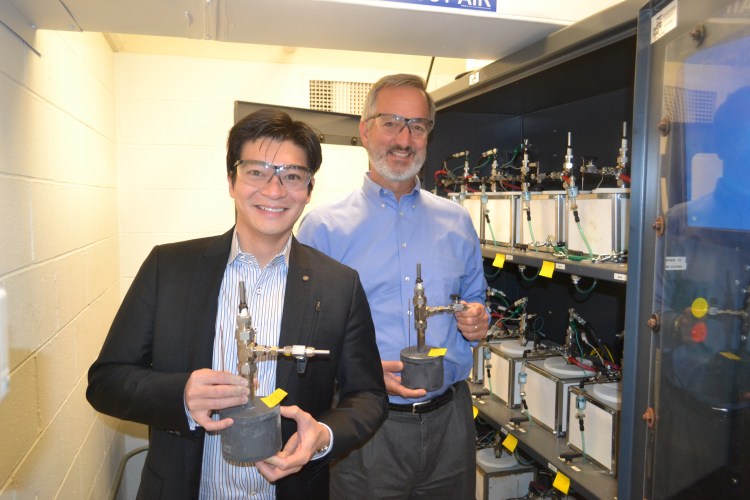Ambri chief executive Phil Giudice is serious.
His Boston-based alternative liquid metal battery startup raised $35 million Wednesday in a C round from a bevy of heavy hitters like Khosla Ventures, Bill Gates, and even Karen Pritzker, of the Hyatt Hotel family clan.
Ambri launched in 2010 under a different name, Liquid Metal Battery Corp. To date, it has raised a total of $50 million. It already has secured launch partners, and it is targeting large enterprise and corporations in order to wean them off the grid.
“The economics are driving us to the big systems of the world,” Giudice told VentureBeat.
Giudice doesn’t mince words — nor is he shy about his ambitions.
“We are building a world-class team that is developing a solution to the energy challenges of the 21st century,” he said.
Ambri’s clean technology was concocted in the MIT laboratory of Donald Sadoway, one of the world’s foremost experts on alternative energy, and Dr. David Bradwell, Ambri’s chief technology guru and one of the company’s co-founders. Between the two, they are widely recognized as pioneers in America’s renewable energy research.
At the heart of Ambri’s clean tech is its energy storage platform. It integrates and stores energy from solar and wind.
According to Ambri’s website:
Each cell consists of three self-separating liquid layers — two metals and a salt — that float on top of each other based on density differences and immiscibility. The system operates at elevated temperature maintained by self-heating during charging and discharging. The result is a low-cost and efficient storage system.
The value proposition is that Ambri will reduce electricity costs for customers and reduce the need for costly development of more traditional power plants, like coal for example. One traditional problem with renewables, like solar and wind power, is that they can’t be produced around the clock. Having an efficient storage system is key to making these alternative energy sources practical.
The name of the game for Ambri is cost efficiency and savings for clients. For example, the average U.S. household spends about 10 cents per kilowatt-hour. Giudice says Ambri can provide it cheaper.
Ambri also promises low costs for building out the platforms. For example, a portion of the funding, $10 million, will be used to build out an entire production facility which otherwise would have cost triple the price, or higher. Previously, the company spent $400,000 developing a prototype factory, building that to make sure producing the technology is viable. Giudice of course says it is.
Guidice told VentureBeat that his batteries have “no fade rate,” which means they don’t lose capacity with use. Unlike lithium ion batteries, which in your cell phone, for example, are used for only two years and then tossed in the trash, he said.
The company is launching with four major partners: Otis Air National Guard Base in Cape Cod, Mass, which also houses a detachment of the U.S. Coast Guard and Defense Intelligence Agency; the island of Hawaii, in conjunction with renewable energy stalwarts Firstwind; rural tracts of country in the state of Alaska; and New York state, in conjunction with Con Edison.
“We went to the most expensive places (in the U.S.) to provide them cost savings by substituting conventional energy sources with renewables and our storage,” Giudice said.
Of further note: When the technology was being hatched at MIT, the research was supported by the U.S. Department of Energy, the Office of Naval Research and the Massachusetts Clean Energy Center.
For Khosla Ventures’ Andrew Chung, Ambri is the future of renewable energy. And a model for industry and cities to someday adapt.
“Cost. Lifetime. Safety. There’s no technology we’ve seen that will match the cost savings” of Ambri, Chung said.


